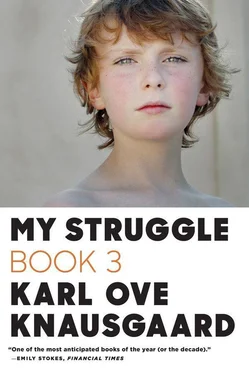Childhood consisted of an infinity of such moments, all equally compact. Some of them could raise me to dizzying heights, like the evening I got together with Tone and half ran, half slid down the hill, which must have just been cleared by the snowplow, judging by the shiny surface, and when I arrived at the dark patch between the roads outside our house, I lay down in the snow on my back and looked up at the dense, clammy, and lightless night above me and was utterly happy.
Others could open a void beneath me, like the evening Mom told us she was going to start studying the following year. We were at the table eating supper when she told us.
“The school’s in Oslo,” she said. “It’s just for one year. I’ll come home every Friday and I’ll be here all weekend. Then I’ll go back on the Monday. So that’s three days here and four there.”
“Are we going to be alone here with Dad?” Yngve said.
“Yes. It’ll be fine. You’ll see a bit more of each other.”
“Why are you going to go to school?” I said. “You’re an adult.”
“There’s something called further education,” she said. “I’m going to learn more about my profession. It’s very exciting, you know.”
“I don’t want you to go,” I said.
“It’s just for a year,” she said. “And I’ll be here for three days a week. And all the holidays. I’m going to have long holidays.”
“I still don’t want you to go,” I said.
“I understand,” Mom said. “But it’ll be fine. Dad wants to spend time with you. And next year it will be the other way around. Dad will do a further education course and I’ll be at home.”
I took the last mouthful of tea, closed my mouth, and let it seep through, as I blocked the many wet, black tea leaves at the bottom with my lips.
I half-rose and lifted the heavy teapot over to the cup with both hands, poured, and put it back. The tea was almost black, it had been brewing for so long. I added a generous portion of milk and three large spoonfuls of sugar.
“Sugar in tea,” Yngve said.
“And?” I said.
At that moment there was the sound of footsteps on the stairs.
Oh, and I had filled the cup to the brim! I would have to sit there until it was drunk. But Yngve had no such reservations; he stood up and was gone.
Dad walked past with a somber step. He switched on the television and sat down on a chair.
“Would you like some supper?” Mom said.
“No,” he said.
I poured in more milk to make the tea colder and drank it up in three long swigs.
“Thank you, Mom!” I said, getting up.
“My pleasure,” Mom said.
The news was shocking, but I wasn’t shocked as I went to my room afterward, it was April now and the course she was doing didn’t start until August. That was four months away and for a child four months is an eternity. Mom’s further education course belonged to the future in the same vague way that my next school did or confirmation or my eighteenth birthday. We were in midchildhood and time was suspended there. That is, the moments raced along at breakneck speed while the days that contained them passed almost unnoticed. Even when the last day of school arrived and we were no longer in the third class I didn’t think that soon she would be off. Wasn’t there the whole of the long summer holiday to go yet? It was only when she was in her bedroom taking out her clothes and a suitcase lay open on the floor that I realized. At the same time there were so many other things going on, the next day school would be starting again, when we, the fourth class, would definitively be among the oldest. We would have a new classroom, and more importantly, a new class teacher. Inside my room there was a new satchel, in the wardrobe there were new clothes. The thought of all this made my stomach tingle, and although I was sad watching her pack I was no sadder than I usually was when she went to work.
She stopped packing and looked at me.
“I’ll be back on Thursday,” she said. “It’s only four days.”
“I know,” I said. “Have you got everything?”
“You know what, I think I have,” she said. “Would you mind helping me with the suitcase? Put your knee there so that I can close it properly?”
I nodded and did as she asked.
Dad came up the stairs.
“Are you ready?” he said with a nod at the suitcase. “I’ll take it.”
Mom gave me a hug and then she followed him downstairs.
I watched them from the bathroom window. As she got into the green Beetle it was exactly like any afternoon when she had to go to work — apart from the suitcase in the trunk, that is. I waved, she waved back, started the engine, reversed up the incline, put the car in first gear, and it beetled down the hill the way it always did and was gone.
What would happen now?
What would the days be like now?
It was Mom who bound us all together, it was Mom who was at the center of Yngve’s and my life, we knew that, Dad knew that, but perhaps she didn’t. How else could she leave us like this?
Knives and forks clinking on plates, elbows moving, heads held stiff, straight backs. No one saying a word. That is us three, a father and two sons, sitting and eating. Around us, on all sides, it is the seventies.
The silence grows. And we notice it, all three of us, the silence is not the kind that can ease, it is the kind that lasts a lifetime. Well, of course, you can say something inside it, you can talk, but the silence doesn’t stop for that reason.
Dad put the bone on the plate with the potato skin and took another chop. Yngve and I were given only one each.
Yngve had finished.
“Thank you, Dad,” he said.
“There’s dessert,” Dad said.
“Don’t want any,” Yngve said. “Thanks anyway.”
“Why don’t you want any?” Dad said. “It’s pineapple and cream. You like it.”
“It makes my face break out,” Yngve said.
“I see,” Dad said. “You can leave the table.”
He looked at me when Yngve got up, as though he didn’t exist.
“But you want some, don’t you, Karl Ove?”
“You bet,” I said. “It’s my favorite.”
“Good,” he said.
I sat looking out of the window waiting for him to finish. Listening to the music from Yngve’s room. A crowd of children had gathered in the road, they put two rocks on the ground as a goal, immediately afterward there was the sound of heavy thuds as boots hit an underinflated ball and of low shouts, which always increase in volume when soccer is played, whatever form it takes.
At last Dad got up, took the plates, and scraped them clean over the trash can. He put a bowl of pineapple and cream in front of me and one in front of himself.
We finished the dessert without saying a word.
“Thanks, Dad,” I said, getting up. Dad said nothing, but got up as well, filled the coffee pot with water, and took a packet of coffee from the cupboard.
Then he turned.
“Karl Ove?” he said.
“Yes,” I said.
“Now don’t you tease Yngve about his pimples, do you understand what I’m saying? I don’t ever want to hear a word about it again.”
“OK,” I said and stood waiting to see if there was more to come.
Dad turned and cut off the corner of the coffee packet, and I went into Yngve’s room, where he was playing his electric guitar, a black Les Paul copy I had been so surprised to hear the first time, as I was convinced not a sound would come from it without an amplifier. But it did, a low plunking sound, he was sitting there and playing with a face full of pimples.
“Want to play something?” I said.
“I already am,” he said.
“A game, you chump,” I said.
“Fifty-two-card pick-up?” he said.
“Ha ha,” I said. “You can only do that once and I’ve already done it. Can you teach me a chord?”
Читать дальше












